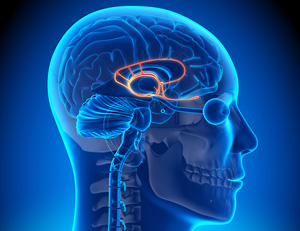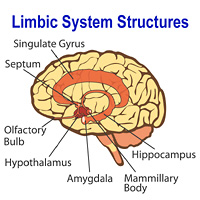Effect Of The Limbic System In Aromatherapy
 We have all experienced the power of the limbic system many times, even though we will not necessarily have been consciously aware of it at the time.
We have all experienced the power of the limbic system many times, even though we will not necessarily have been consciously aware of it at the time.
For example, at some point in our lives most of us have all been greeted by a fragrance that triggered a powerful memory, perhaps one dating back as far as our early childhood.
The smell of freshly baked bread or apple pie conjures up long forgotten childhood memories of your mother baking, or a whiff of perfume you’ve not encountered for years transports you back to your first true love at high school.
The response to this type of stimulus is lightening fast; you don’t have time to stop and contemplate what the aroma reminds you of because you are catapulted back in time in a nanosecond, and will often feel a powerful emotional response that can bring a smile or even lead to tears.
When this happens, you have just experienced the awesome power of the limbic system, which mediates and controls all aspects of your emotions, memories, and even your very survival. This response demonstrates how essential oils can affect your emotions and proves that your brain can link aromas to memories, that in some cases may last a lifetime.
What is the Limbic System?
The limbic system is the collective name for functionally and anatomically interconnected structures in the human brain involved with emotion, motivation, the regulation of memories and hormones, sexual arousal, circadian rhythms, and is generally considered the interface between emotional states and memories of physical stimuli. It is also the oldest part of the brain where our most primitive senses reside such as basic drives, instincts, needs and avoidances. Damage to the limbic system can result in an inability to experience pleasure and emotions.
In addition to its primary functions, the limbic system also plays a significant role in selecting and transmitting information between our short and long-term memories. Selection of, and transmission to these two memories, is performed via corresponding associated regions of the limbic system that receive their information from the various sensory regions such as the sense of smell. This is why the perception of certain fragrances can cause the recollection of distant memories or powerful emotions. Interestingly, the memory of a fragrance is held longer than the visual memory it is associated with.
How does it work?
This complex v-shaped structure sits on top of the brain stem and is made up of the hippocampus, amygdala, part of the thalamus and the hypothalamus and several regions of the cerebral cortex. This highly complex system has approximately 34 structures and 53 pathways, and since aromas, emotions, and memories all meet here you see why smell can trigger specific memories and emotions.
 The hypothalamus is one of the most active parts of the brain, receiving signals and regulating the response to pain, thirst and hunger, levels of pleasure and sexual satisfaction, anger and aggressive behaviour, darkness and light.
The hypothalamus is one of the most active parts of the brain, receiving signals and regulating the response to pain, thirst and hunger, levels of pleasure and sexual satisfaction, anger and aggressive behaviour, darkness and light.
It also regulates the autonomic nervous system which governs your blood pressure, pulse, breathing, digestion, sweating, and arousal in response to emotional circumstances. In many ways the hypothalamus acts like a regulator or thermostat, restoring equilibrium (homeostasis) when the body is out of balance.
Another way the hypothalamus takes control of your body is via its neural and chemical connection to the pituitary gland (also known the ‘master gland’), which in turn receives instructions to release hormones into the body that regulate metabolism and growth. These two organs are key to the way that aromatherapy works.
Essential response
When you sniff an essential oil, odiferous molecules enter the nose and travel to the top of the nasal cavity where 50 million smell receptors called ‘cilia’ occupy an area about 2 square centimetres above each nostril in the olfactory system. When an odour molecule penetrates these receptors it sends a signal to the olfactory bulb which is a major structure within the limbic system, and where the olfactory impressions are first processed. From there, odour impulses are sent to the olfactory cortex in the temporal lobe and the limbic system.
Essential oils have a powerful effect on both the hypothalamus and pituitary gland, which are stimulated to produce neurochemicals and hormones that balance and regulate various systems within the body, such as the endocrine, immune, and nervous system. Hormones are like chemical messengers that target specific cells in the body, and their arrival in those cells will trigger a particular response. Therefore, when we inhale an essential oil with sedating or stimulating properties it will produce a response in the appropriate system, and sometimes in several systems simultaneously.
The mind-body connection
When an aromatherapist treats a client for long-term stress, the essential oils they use in the treatment will cause various parts of the limbic system to spring into action, triggering the release of neurochemicals and hormones that will slow the heart rate, regulate blood pressure, and stimulate the immune system.
This last action is very important, because stress causes adrenalin and cortisol to be produced by the body as part of the ‘fight or flight’ response which is essential for survival, but damaging over a period of time because these chemicals suppresses the immune defences making us more susceptible to disease and illness.
Modern science is investigating the interrelationship between psychology and fragrance by studying the emotions produced when odours activate the olfactory pathways leading to the limbic system. Research has now scientifically proven that essential oils can change mood, behaviour and productivity, and have determined which neurotransmitters were released to cause this effect. For example, serotonin produces a relaxing, soothing effect while certain endorphins inhibit pain and increase sexual arousal.
The results of this type of research opens up a mind-boggling range of possibilities for future medicine, providing it is put to creative medicinal use. Not that it really matters to those of us who have worked in aromatherapy for any length of time, but it has been finally confirmed by scientists that essential oils can influence both the mind and the body, as we have always claimed.
Perhaps it will now be a little easier for the sceptics to understand and accept why aromatherapy has been so popular – and effective – during the past 35 years.
Copyright © Quinessence Aromatherapy Ltd 2010. Written by Geoff Lyth

































